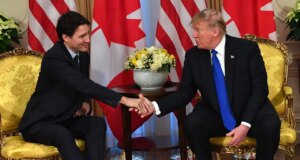Good morning.
Despite Donald Trump’s decisive victory in the presidential election, a political scientist who developed a model that correctly predicted his sweep of battleground states warns that voters have not necessarily given the president-elect a mandate to make radical changes.
Peter Enns, a Cornell University professor of government, said his model’s conclusions suggested voters chose Trump not because they wanted to see his divisive policies implemented, but rather because they were frustrated with the state of the economy during Joe Biden’s presidency, an obstacle Kamala Harris was not popular enough to overcome.
-
What did Trump’s Ukraine envoy pick controversially propose? The retired lieutenant general Keith Kellogg has written that the US could help end the war by withdrawing weapons from Ukraine if it does not enter peace talks – and giving even more weapons to Ukraine if Russia does not do the same.
-
What’s Musk’s latest big idea? The tech billionaire Elon Musk, who has been tapped to run a “department of government efficiency” has said he wants to “delete” the Consumer Financial Protection Bureau, a federal watchdog that helps protect consumers from predatory financial practices.
Mexican president claims ‘no potential tariff war’ with US after call with Trump
Claudia Sheinbaum has said her “very kind” phone conversation with Trump, in which they discussed immigration and fentanyl, means “there will not be a potential tariff war” between the US and Mexico.
The president of Mexico spoke on Thursday after Trump’s threat earlier in the week to apply a 25% tariff against Mexico and Canada, and an additional 10% tariff against China, when he takes office in January if the countries did not stop all illegal immigration and fentanyl smuggling into the US. Sheinbaum clarified she did not agree to shut down the border.
-
Did they discuss tariffs? No, according to Sheinbaum, but she nevertheless said that her conversation with Trump had reassured her that no tit-for-tat tariff battle would be needed in future.
Israeli military to remain in Gaza for years, food minister says
The Israeli military will remain in Gaza for many years, fighting against fresh Hamas recruits in the territory and could be responsible for delivery of humanitarian aid there, a senior Israeli minister has said. The comments by Avi Dichter, Israel’s minister for food security and a member of the security cabinet, confirm an emerging picture of a long-term deployment of Israeli troops inside Gaza.
There is no immediate Israeli plan for any other administration to govern the territory’s 2.3 million people and begin reconstruction there. Israel has been accused of clearing parts of Gaza as part of a deliberate plan to permanently displace residents, but denies the charge.
In other news …
-
Police have clashed with protesters in the Georgian capital, Tbilisi, after the ruling party said the government would suspend talks on EU accession until 2028.
-
Women targeted by Taliban officials and detained under anti-begging laws have claimed they were subjected to sexual abuse, torture and forced labour, and witnessed children being beaten and abused.
-
Spain’s leftwing government has approved “paid climate leave” of up to four days to allow workers to avoid traveling during weather emergencies, a month after floods killed at least 224 people.
-
Authorities in Laos have banned the sale and consumption of a brand of whisky and vodka after the death of six tourists from a suspected mass methanol poisoning this month.
Don’t miss this: Germany and the Nordic countries prepare citizens for possible war
In the event of attack, Germany is developing an app to help people locate the nearest bunker. Sweden is distributing a 32-page pamphlet titled If Crisis or War Comes. Half a million Finns have already downloaded an emergency preparedness guide. If the prospect of a broader conflict in Europe seems remote for many, some countries at least are taking it seriously – and, in the term used by Germany’s defence minister, Boris Pistorius, taking steps to get populations kriegsfähig: ready for war.
… or this: Astonishment as missing Canadian hiker emerges after weeks in wilderness
Sam Benastick, a 20-year-old hiker, was moving slowly and unsteadily with the help of a walking stick in each frostbitten hand when he encountered two oil and gas workers in the British Columbia wilderness. When they took the sticks from his hands to help him into their truck, he nearly collapsed. He is now being treated in hospital after surviving 50 days lost, before being found alive “in an unbelievable miracle”.
Climate check: Dutch suburb where residents must grow food on at least half of their property
When Marco de Kat starts planning his meals, he does not need to travel far for fresh food. Right outside his house is an 800 sq-metre plot with all sorts of produce. Oosterwold, where de Kat has lived since 2017, is a 4,300-hectare urban experiment located in the north-east of the Netherlands that has about 5,000 residents and a growing waiting list. Hannah Docter-Loeb visited the self-sufficient suburb.
Last Thing: Sex educators on 16 ways to talk to your children about bodies, porn and consent
Most parents and caregivers do not relish talking to young people about sex. But, with graphic content only a few clicks away, such conversations are more important than ever. Sex educators share their tips with Sarah Phillips on how to communicate well with kids about bodies, relationships and consent.
Sign up
Sign up for the US morning briefing
First Thing is delivered to thousands of inboxes every weekday. If you’re not already signed up, subscribe now.
Get in touch
If you have any questions or comments about any of our newsletters please email [email protected]




